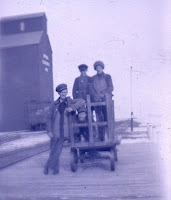This story I tell you now is a true yard told to me by Oscar Veale who, at the time around 1930 or so, Oscar was farming with his Dad about a couple miles west of town. Just on the east side of Antler there is quite an incline where the railroad tracks come into town, I can recall in those days that sometimes the train would have trouble getting up the grade and would, on some occasions, stop; split the train and bring half of it into the station and go back for the other half.
This particular day, Oscar had come into the station with a team and wagon. The train stopped down the hill and the fireman came walking into the station. This time the problem was grasshoppers. They were so thick that when the train ran over them on the track, they greased up the rails badly. For such times the engine normally had sand in a container which it would release in front of the driver wheels but it had run out of sand and so was stalled.
The fireman asked Mr. Brown the agent if he knew of any place close that they could find some sand. This is where Oscar came into the picture. He said he knew of some sand on John Cale's land just a short distance to the west side of town and that he would take them there and get some in his wagon.
 |
| Antler Rail Road |
The crew then let sand down in front of the driver wheels, spun them a f
ew times and the wheels began to grip the rails and the train was able to proceed on into the rail yards at the station. After unloading the freight material they were on their way to the next station.







